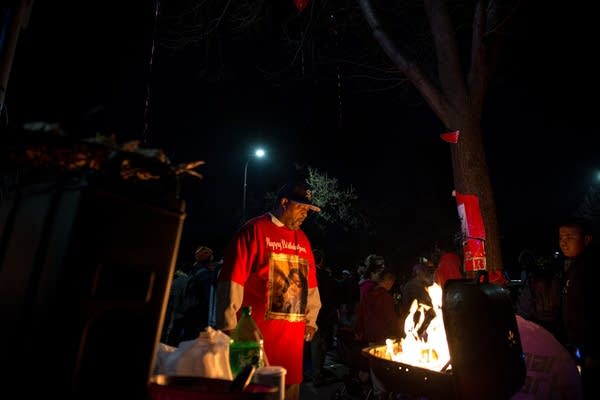A year after Jamar Clark's death, a flash of hope and the hint of change

Go Deeper.
Create an account or log in to save stories.
Like this?
Thanks for liking this story! We have added it to a list of your favorite stories.
The people gathered on Plymouth Avenue North Tuesday night clutched candles and listened to Jamar Clark's father.
"It just hurts every day that I wake up," James Clark told the crowd. "I don't see him around anymore. And I just don't know. The only thing we can do is stick together like we've been doing and pray, and hope God sees fit to turn this thing around, because it needs to be turned."
They were standing near the spot where, a year earlier, Jamar Clark, a 24-year-old African-American man, was fatally shot in the head by a Minneapolis police officer during a scuffle. For the next 18 days, demonstrators occupied the space outside the nearby 4th Precinct of the Minneapolis Police Department to protest Clark's death.
This week, Jamar Clark's friends, family and activists gathered to remember him — and to renew their calls for the officers' prosecution. They released black and red balloons in Clark's honor, and they marched the several blocks from the shooting site to the 4th Precinct.
Turn Up Your Support
MPR News helps you turn down the noise and build shared understanding. Turn up your support for this public resource and keep trusted journalism accessible to all.

It's hard to believe it's been a year, James Clark told the group. But he was hopeful: Sustained public attention to his son's death, he said, might eventually lead to an end to police killings of unarmed people.
Investigators found no weapons on Jamar Clark. But they said he had a hand on an officer's gun while the two scuffled on the ground during a confrontation. Officers had been told he was interfering with a paramedic crew that had been called to a late-night birthday party.
Hennepin County Attorney Mike Freeman said in March that officers Mark Ringgenberg and Dustin Schwarze were justified in using deadly force in the incident, and did not press charges against them.
Tene Wells, 64, is from north Minneapolis, the neighborhood where Jamar Clark was shot. She's not as optimistic that tensions between police and communities of color will ease. The election of Donald Trump — who has called for law and order — she said, has left her demoralized. She fears young black men will continue to die in similar confrontations.
"We will not see change until we are ready to sacrifice who we are and the comforts of our lives to stop the madness of killing people," Wells said. "It won't stop. It's going to get worse."

Former Minneapolis NAACP president Nekima Levy-Pounds — among the leaders of last year's protests — was at the 4th Precinct earlier Tuesday to announce her bid for mayor of Minneapolis. Now, she said, people from a variety of religious, racial, and socio-economic backgrounds are fighting together for racial equity.
"There's been more pressure on the Minneapolis Police Department than I think they've experienced throughout the entire time that they've been in existence," she said Tuesday. "We have on many occasions crowded the chambers of City Hall, and we've demanded justice."
Two blocks down Plymouth Avenue North at the Minneapolis Urban League, president Steven Belton said Jamar Clark's killing a year ago — and the fatal police shooting of Philando Castile in Falcon Heights last summer — have brought context and attention to Minnesota's worst-in-the-nation racial disparities: "And I think some people of good will said, 'What can we do about this? Do we have a stake in this? Are we doing the best that we can? Are we giving our best efforts?' And of course the answer to those questions is: 'No, we were not.'"
Belton said he remains frustrated by what he calls the "serial dismissal" of accounts from black witnesses that Clark was handcuffed when he was shot — investigators said there's no evidence he was — and the failure of authorities to hold the officers accountable.
But Belton said he sees hope in some changes within the Minneapolis Police Department. He points out — as did Mayor Betsy Hodges in a statement this week — that everyone on the force must undergo implicit bias training. And after a three-year evaluation period, all officers are wearing body cameras.

Minneapolis Police Federation President Bob Kroll insists the officers did nothing wrong.
But Kroll shares Belton's optimism that body cameras could decrease tensions between police and the public.
"It'll take you inside the eyes of what police see and deal with a lot of times," Kroll said. "As a result, I think complaints and lawsuits will drop. The officers are subject to more scrutiny now more than ever, and I think they're acting accordingly."
In the meantime, prosecutors are moving forward with cases against four men accused in an attack on protesters near the 4th Precinct last Nov. 23. Three of the four are due in court Tuesday. Lance Scarsella, 24, who allegedly shot and wounded five people that night, remains jailed and is scheduled to stand trial in January on multiple assault charges.
MPR News reporter Brandt Williams contributed to this report.


